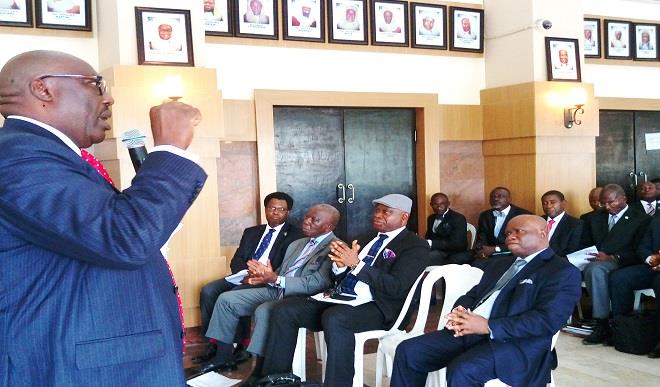
When lawyers under the aegis of Human Right Law Service (HURILAWS) gathered in Lagos few days ago, they said they had come with the sole aim of assisting Nigeria to have a constitution that works.
For a constitution that attracted so much criticism but with little changes so far, the concerns of the lawyers could be described as timely.
And for a country known for organising constitutional conference per each administration, most of which have achieved little or nothing, the recent move by the National Assembly to yet again saddle both the Deputy Senate President, Ike Ekweremadu, and Deputy Speaker of House of Representatives, Yusuf Lasun, committees with the responsibilities of amending the constitution, is being perceived as the right opportunity.
The right lawyers led by Collins Okeke at the gathering said since both chambers of the National Assembly have again inaugurated committees on the constitution, it is important to bring to limelight, four sections of the constitution that should be reviewed to “make it a constitution that works”.
Areas being considered for amendment include: Section 1 of the principal Act of the constitution which deals with the proclamation of the constitution’s supremacy; Section 81 (1) & (2) of the Constitution which they said “gives the impression that budget estimates of the judiciary is part of the Appropriation Bill”; Section 251 (1) of the Constitution which they said was not explicit on jurisdiction shared by both the Federal High Courts and Specialised Tribunals; and Section 153 which establishes National Institutions that ought to function as executive agencies but are still tied to the apron-string of the Executive.
According to Okeke, HURILAW believes that Section 1 of the Constitution should contain a Declaration of Nullity Clause.
He said the constitution should be able to declare unconstitutional acts, null and void.
“It is not enough for the courts alone to declare nullity. Evidence of violation of constitutional provisions should be enough for acts to be considered null and void. The courts would only play a narrow role of declaring invalid, any breach of the constitution. Section 1 of the principal Act should be altered by inserting immediately after Subsection (3), a new Subsection “1(4).
“We can therefore have something like: ‘1 (4) If any act is inconsistent with the constitution, that act shall be null and void’,” Okeke said.
On Section 81 (1) & (2), the HURILAW leader who is also the Senior Legal/ Programme Officer at Olisa Agbakoba Legal Firm, said the non-separation of jurisdiction under the Federal High Court has become a tough challenge for legal practitioners and needs to be clarified.
“The Federal High Court in Olisa Agbakoba vs. Attorney General & 2 others Suit FHC/ABJ/CS/63/2013 has decided that the Executive cannot appropriate for the Judiciary. Section 81 of the principal Act should be altered by inserting immediately after Subsection (2), a new Subsection ‘81 (2) A & B,’” Okeke said.
He said the group is suggesting that: “81 (2) (A) notwithstanding Subsection (2), estimates of the revenues and expenditures of the Judiciary are not part of the Appropriation Bill while in “81 2 (B), there should be a provision that read thus: The National Judicial Council shall cause to be prepared and laid before each House of the
National Assembly at any anytime in each financial year estimates of the revenues and expenditures of the Judiciary.”
On Section 251 (1) of the Constitution which the lawyers observed was not explicit on jurisdiction shared by both the Federal High Courts and Specialised Tribunals, Okeke said the non-separation of jurisdiction is capable of stirring conflict in judiciary.
“Although this has been contested up to the Supreme Court because of the provision of Section 251 (1) of the Constitution, the constitution still needs to clarify the jurisdiction of the Federal High Court and these specialised tribunals to avoid conflicts. The international best practice is to encourage specialised administrative tribunals because they have technical expertise, flexibility and speed. The regular courts tend to lack skills and are overcrowded,” Okeke said.
He said HURILAW is proposing two options which include: “Option 1 – make jurisdiction of the Federal High Court in Section 251 (1) concurrent.
Section 251 (1) of the principal Act is altered by deleting from Section 251 (1) the words “to the exclusion of any other court.” And
“Option 2 – clearly delineate jurisdiction of the Federal High in relation to specialised tribunals. This will require alteration of Section 251 (1) (a)-(s) of the principal Act.”
On the last section of the constitution being proposed for amendment, the legal practitioners are suggesting that Nigeria should incorporate Chapter 9 of the South African Constitution to replace Section 153 or Section 153 of the Nigerian Constitution be amended to strengthen and ensure independence for critical agencies of government such as INEC, Police, ICPC, Accountant General, Attorney General, CBN, National Human Rights Commission, EFCC, Public Defender and Code of Conduct
Bureau.
“They should be recognised and made vital National Institutions. They should be entitled to first charge on the federation account and other necessary guarantees by the constitution,” Okeke said.
Another lawyer at the event, Dr Wilfred Mammah, Head, Development Law Group, however, said the group’s recommendations could not be said to have encapsulated all that needed to be reviewed in the constitution, but that these remain key areas where whatever efforts being discharged for constitution review must not gloss over.

 Join Daily Trust WhatsApp Community For Quick Access To News and Happenings Around You.
Join Daily Trust WhatsApp Community For Quick Access To News and Happenings Around You.



